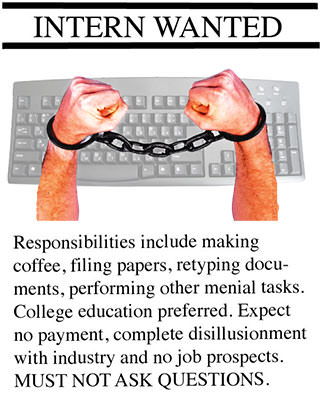It’s Just Business: How Corporate America Made Slaves of the Young
Companies across the nation are gleefully denying interns fair wages for their work, in flagrant violation of long-standing labor law, and have the nerve to tell the world they are doing these people a favor.A disturbing percentage of U.S. companies accepts as routine the illegal work of unpaid interns.
Companies across the nation are gleefully denying interns fair wages for their work, in flagrant violation of long-standing labor law, and have the nerve to tell the world they are doing these people a favor.
Huge numbers of college students and recent graduates in a tight labor market are too scared to ask for compensation. Consequently, many interns must work for years in unpaid positions to build their résumés while depending on their parents for financial support. Not only do unpaid internships stop some from paying down a collectively exploding student debt, they compound the economical class differences between those who can afford to work for free and those who can’t.
This exploitative practice has evolved over the generations since the passage of the Fair Labor Standards Act in 1938 and a 1947 Supreme Court ruling about railroad trainees that officially defined unpaid internships; that ruling was mostly ignored by businesses, and today’s systemic abuse of interns eventually developed.
Now, a disturbing percentage of U.S. companies accepts as routine the illegal work of unpaid interns. One of the legal challenges to the abuse is a class-action lawsuit against the Hearst Corp. being pressed by the New York employment law firm Outten & Golden on behalf of interns who claim they were improperly denied wages and benefits at 19 of Hearst’s magazines. The law firm is pursuing two other corporations on similar grounds, Fox Searchlight and television’s “The Charlie Rose Show.”
In the suit against Hearst, the principal complainant, a former intern at Harper’s Bazaar, says she often worked 40 hours a week without pay or benefits. Hearst’s lawyers maintain that the corporation can lose in the proceeding only if the court reads the law in “a novel and rigid way.”
The corporation’s lawyers, by in effect admitting that a “rigid” reading of the law could vindicate the interns’ charges, suggest there is validity to the widespread charges that the letter of the law is being ignored in the American marketplace. Indeed, any objective analysis of unpaid internships in the U.S. points to illegal exploitation not only in the journalism industry but in almost every other business sector as well.
This prevailing, callous attitude toward interns was affirmed in a July 11 article in Forbes — Kate Harrison’s “Why Interns Are Your New Best Friends,” which offers tips on how businesses can best use interns. However welcome those tips may be to companies, the Forbes piece fails to address the basic issues that afflict unpaid internships.
Interns, few of whom receive a paycheck or benefits, can be found performing a wide variety of duties, including data entry, filing, writing copy and running social media campaigns. The use of interns for such tasks was popularized in the fashion and telecommunications industries and has since spread to nearly every other area of business. These unpaid workers are desperate to make industry contacts and build their résumés, and fear of creating a bad name for themselves usually keeps them from complaining about how they are treated.
Because of the informality of the arrangement, statistics about U.S. internships are sparse. The Department of Labor estimates that between 1 million and 2 million Americans work as interns, and Robin Richards, the CEO of Internships.com, says that only about 34 percent of those listed on his website are paid. Statistics compiled by Business Insider indicate that 75 percent of students at four-year colleges have had an internship and that corporations save almost $2 billion each year through internships.
The reality is that interns perform many important day-to-day corporate operations, especially the most monotonous work. One summer intern contacted by Truthdig left a major human rights advocacy group after just a week when she realized she would be performing only “mundane tasks such as editing grammar mistakes for papers, running errands for the boss and waiting on others everyday.” “I wanted an internship that can heighten my skills, not simply buying groceries for a wine and cheese party,” she said in an email interview.
The prevalence of unpaid internships means that the usual employment path for service workers has disappeared. Gone are the days when young workers could walk from their college graduation into an entry-level position in a mailroom or running copy at a small newspaper. Now, a graduate’s career may hang on landing an impressive internship through the connections of relatives, friends or former teachers. It may take years of internships before a person can find a paid position with career potential. In the meantime, homeownership — a major part of the economic engine — and marriage may have to be delayed. Unpaid internships ultimately work to the detriment of both the interns and the overall economy.
The most fundamental question in a discussion of any economic practice should be its legal status. Companies, interns, governments, universities and their respective lawyers differ widely in their interpretations of laws and rules related to internships. The Forbes article makes a great show of explaining the legal distinction between paid and unpaid internships. Harrison, after citing six criteria of the Labor Department for companies’ use of unpaid interns, notes that the federal government requires that any intern who produces “immediate advantage” to an employer be paid at least the legal minimum wage. “In other words,” she writes, “if you want interns to do data entry and coffee fetching, you’d better offer them minimum wage.”Although the Forbes article has a hyperlink to the Labor Department criteria, which appear in government documents under the heading “The Test for Unpaid Interns,” Harrison does not present them in full. Here they are:
1. The internship, even though it includes actual operation of the facilities of the employer, is similar to training which would be given in an educational environment; 2. The internship experience is for the benefit of the intern; 3. The intern does not displace regular employees, but works under close supervision of existing staff; 4. The employer that provides the training derives no immediate advantage from the activities of the intern; and on occasion its operations may actually be impeded; 5. The intern is not necessarily entitled to a job at the conclusion of the internship; and 6. The employer and the intern understand that the intern is not entitled to wages for the time spent in the internship.
If those standards seem naive and a departure from contemporary practices, it may be because they were enacted in the Fair Labor Standards Act of 1938. But nonetheless they are the law, regardless of how often businesses violate them. The primary message of the official standards is that an unpaid internship must stem from the good will of the employer, which must provide education to the intern and receive nothing in return.
These government criteria come with a caveat, however: The rules apply only to internships at for-profit organizations. There are exceptions for nonprofit and government work, in which interns can be called “volunteers” (those exceptions are currently under review by the Labor Department). But Chris Tilly, director of UCLA’s Institute for Research on Labor and Employment, does not absolve nonprofits from criticism. He maintains that nonprofits’ heavy use of unpaid interns, apart from having negative effects on the young employees, is detrimental to the organizations themselves. “Nonprofits need to be sustainable, which includes sustainable careers,” he said in a telephone interview. Unpaid internships, he pointed out, involve a quick turnover rate, which detracts from the viability of long-term positions at a nonprofit.
Internship conditions vary considerably according to the size of the company involved. Whitney Green, a former executive of the Walt Disney Co., told Truthdig, “It’s work for a company to have to do it legitimately [employ interns] — you have to teach [them].” She went on to say that Disney has only two or three corporate internship slots and does pay its interns. Green noted that many smaller companies keep payrolls down by using unpaid interns in the production of low-budget films.
Here’s one example of how a small company — in this case a Brooklyn merchandiser — uses an intern to lower company costs. The unpaid employee, a junior at Claremont McKenna College in Southern California, said in an exchange of emails with Truthdig that he enjoys his job and that “while I get my fair share of ‘intern work,’ like making deliveries … using the subway or a minivan, I’ve also had my fair share of more substantial responsibilities: opening new accounts, negotiating deals with buyers, drafting applications for substantial grants, cleaning up and streamlining [the] sales database and managing a campaign to bring the product to college campuses.” Although he is benefiting from the work experience and isn’t complaining, an outside look reveals that the company is violating some of the criteria set by the Department of Labor.
Even though the particulars differ, it’s almost as if this intern’s employer had read Forbes’ article. Harrison, the writer, gives five ways that employers can benefit from interns, most of which fly in the face of her advice that businesses pay interns. For instance, her second tip: “Offloading: Even unpaid interns can take on some of the more time consuming tasks that every organization must deal with. …”
No, they can’t. The Department of Labor says so. Check out requirement No. 4 in the list above.
Assume that an unpaid intern is being used to operate a business’ social media campaign. Such a program clearly adds to the value of a company. If you want an unpaid intern to work on social media for your business, he or she must do it alongside a paid employee performing that function and must be in a position to learn about how a company uses social media. An unpaid intern working alone on social media is not in an educational environment; probably would be displacing an employee who would normally work on social media; and surely would produce immediate advantage for the employer. All of which violate the official criteria.
Which brings us to a key question: How does an intern get fair compensation in today’s marketplace? Interns are usually desperate, and companies exploit that. Some employers feel that an unpaid intern has received enough reward by simply being hired, and they also play on the emotional pressure inherent in the arrangement — interns’ anxiety about asking for money.
I myself am an intern, and when the time came during the hiring process for me to ask about compensation I hesitated to do so out of concern that I would immediately be shown the way to the door. I did ask, and I was not thrown out, but the fear is very real for prospective interns across the country.
Some might say I’ve been overly critical of the author of the Forbes article, Kate Harrison. After all, she does urge organizations to pay their interns. However, her article slyly perpetuates the idea that there’s a free lunch for companies. She calls interns the “best task force money can’t buy,” suggests that employers hire interns for second, out-of-office jobs like baby-sitting, and pitches interns as cheap guinea pigs, saying they “can allow you to test new ideas or programs at little or no cost.” In pushing its pro-business agenda, Forbes descends into hypocrisy.
The reason I have singled out the Forbes article is because the negative attitudes it has toward interns are not isolated. Many businesses share Harrison’s cost-minimizing approach, along with a casual willingness to ignore state and federal law.
Larger businesses, like NBA teams that have public relations interns, in most cases can afford to pay a few interns and thereby avoid the risk of public censure that might come from being sued over unpaid internships.
Aware of that risk, many businesses at least make some attempt to meet the criteria for an unpaid internship. Usually, this consists of requiring an in-college intern to register for academic credit at the intern’s college or university. Many graduate programs require internships as part of routine coursework, and undergraduates can earn course credits through an independent study or a special internship class. Sixty percent of students report that their schools require internships for graduation, according to InternBridge.com. Awarding and institutionalizing academic credit as compensation for unpaid work acts as a seal of approval from colleges and universities that fosters the erroneous belief that academic credit alone satisfies the Labor Department’s requirements and ensures that the internship is educational.
Academic credit for the intern does not mean that the program is educational, and educational value is only one part of the Labor Department criteria; “academic credit alone does not guarantee that the employer is in compliance.” Under the law, internships with academic credit still must not produce any value for the organization and still must not replace any paid employees.
Despite a 2010 letter to the U.S. Labor Department from 13 college and university presidents claiming that “our institutions take great pains to ensure students are placed in secure and productive environments that further their education,” accountability for and enforcement of educational working conditions still vary greatly within and between schools. The letter urged Labor Department officials to ease regulations on unpaid internships, promising that schools could ensure the educational value of internships themselves.
UCLA’s Tilly points out that many schools are decentralized, meaning individual departments that issue the academic credits for internships have their own processes for ensuring that the positions are educational. Interns might write papers, submit reports, give presentations or do nothing whatsoever that could be evaluated, and their evaluators could be either department heads or graduate students, depending on the institution. Given the variations in quality of evaluation, neither employers nor colleges and universities can rightly claim that awarding academic credit accurately reflects educational value in an internship.
Besides concerns about misrepresentations of the value of academic credit, there are strong societal and economic forces at work here. If wages represent the value of an employee’s work, an unpaid intern has no economic value. However, interns clearly are valuable to companies, illustrating an inconsistency in the market for workers derived from an intern’s lack of bargaining power. Internships demonstrate to employers a willingness to work for free, devaluing interns’ work for both the workers and potential future employers. If the résumé of a recent graduate is full of unpaid work, he or she well might be hired only for more unpaid internships or, if a real job is landed, be underpaid.
Only the well-off can afford to work without pay for two years after graduating, or for that matter during college summer breaks, and this bars even middle-class graduates from competing in job markets that look to internship experience. Such fundamental inequities in access worsen an already unfair system of wage denial.
However, interns can take heart; there are a variety of solutions available to them.
First among these is building awareness of interns’ legal status among colleges, employers and the interns themselves. If every student knew that many unpaid internships are illegal, students would have less fear that others would work for free if they themselves refused to do so. If businesses continued to participate in illegal unpaid internships, colleges and student groups could join forces to protect interns. Unpaid interns, made aware of their disenfranchisement, could organize, or join with existing labor groups such as the SEIU. (After all, wasn’t the labor movement’s primary goal fair wages and benefits for abused workers?)
Actual enforcement by state and federal governments would build awareness of interns’ rights as well. Jose Millan, former California labor commissioner, noted in a phone interview for this article that “any time there’s a scarcity of resources on a governmental level, it behooves [federal and state agencies] to pool resources and take on high-profile cases and publicize them.” The current method of enforcement based on individual complaints, he said, is ineffective because it is underfunded. Although prosecuting every case would be an overwhelming task, taking a few major cases and making examples of them would scare companies into compliance. Once most companies follow labor laws, a complaint system becomes workable.
It is a testament to moral blindness in our economic structure that companies can tell young workers they won’t be able to find work without a résumé built around what amounts to slave labor. The abuse of unpaid workers will continue until the government decides to enforce its own laws, or interns collectively realize the truth about their servitude and decide to take action—by organizing, by suing or by boycotting employers. Otherwise, improper unpaid internships will continue to the detriment of interns, schools and the entire country.
Ms. Harrison and Forbes, both complicit in this de facto serfdom, should own up to the sad reality they have helped perpetuate. Better yet, they should call for actions to remedy the problem and properly reward the interns so many companies depend on.
Your support is crucial…With an uncertain future and a new administration casting doubt on press freedoms, the danger is clear: The truth is at risk.
Now is the time to give. Your tax-deductible support allows us to dig deeper, delivering fearless investigative reporting and analysis that exposes what’s really happening — without compromise.
Stand with our courageous journalists. Donate today to protect a free press, uphold democracy and unearth untold stories.









You need to be a supporter to comment.
There are currently no responses to this article.
Be the first to respond.